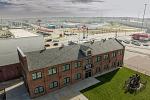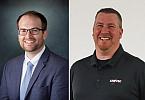Senior Editor
- FMA
- The Fabricator
- FABTECH
- Canadian Metalworking
Categories
- Additive Manufacturing
- Aluminum Welding
- Arc Welding
- Assembly and Joining
- Automation and Robotics
- Bending and Forming
- Consumables
- Cutting and Weld Prep
- Electric Vehicles
- En Español
- Finishing
- Hydroforming
- Laser Cutting
- Laser Welding
- Machining
- Manufacturing Software
- Materials Handling
- Metals/Materials
- Oxyfuel Cutting
- Plasma Cutting
- Power Tools
- Punching and Other Holemaking
- Roll Forming
- Safety
- Sawing
- Shearing
- Shop Management
- Testing and Measuring
- Tube and Pipe Fabrication
- Tube and Pipe Production
- Waterjet Cutting
Industry Directory
Webcasts
Podcasts
FAB 40
Advertise
Subscribe
Account Login
Search
Of course algebra is necessary
- By Tim Heston
- July 31, 2012
Holy moly.
I can honestly say that without algebra, geometry, and trigonometry (along with a bit of chemistry), I wouldn’t have my career. I write about technology and business. I may not solve quadratic equations every day, but the math I learned in high school certainly helped me learn about sheet metal flat layout, press brake work, and metrology. I wasn’t a math wiz in school either. I loved to write, not solve for x. If algebra wasn’t a required, standard part of the curriculum, I wouldn’t have taken it.
But I did. I was blessed with a good math teacher who showed us the meaning behind the equations as well as the equations themselves. His and other math classes also helped me to look at some intimidating stuff--the equations in algebra II, geometry, trigonometry, and calculus--and be less intimidated. Did I do well? Heck no. I struggled. Writing came easy; math didn’t, and that remains true today. Regardless, I think that high-school-math experience helped shape the rest of my life.
Hacker describes how community colleges offer machine tool mathematics tailored to meet the technical worker needs of specific industries. He writes, “That sort of collaboration has long undergirded German apprenticeship programs. I fully concur that high-tech knowledge is needed to sustain an advanced industrial economy. But we’re deluding ourselves if we believe the solution is largely academic.”
I’m not so sure. A college friend of mine majored in both education and mathematics. He got a job at a technology company with an eye-popping starting salary. He didn’t bother applying for any teaching jobs. It’s a shame, too. I think he would have made a great teacher.
To some extent Hacker’s proposals reflect what technical college teachers have told me is already happening. Students now graduate high school with minimal grasp of math. So technical colleges must teach some remedial stuff--how to read a ruler and such--to get the up to speed, before even introducing the math skills demanded by local industry.
But I think most technical college teachers would prefer high school graduates have a better grasp of math from the get-go. In fact, if students learn only what local industry needs, it limits future opportunities, especially if their future employers don’t offer additional training. They get a job, learn how to do one thing all day, every day, then get laid off during the next economic downturn and become a statistic. Meanwhile, students who develop critical thinking skills along with a solid technical and mathematical foundation continue to go far.
These days, the more you know, the more employable you are. And even during recent, rocky economic times and sky-high unemployment, company leaders in technical fields have been screaming for more employable people. If we can't find these people, we look abroad. If those abroad find opportunity elsewhere, our economy will cease to grow.
So yeah, algebra is quite necessary.
subscribe now

The Fabricator is North America's leading magazine for the metal forming and fabricating industry. The magazine delivers the news, technical articles, and case histories that enable fabricators to do their jobs more efficiently. The Fabricator has served the industry since 1970.
start your free subscriptionAbout the Author

Tim Heston
2135 Point Blvd
Elgin, IL 60123
815-381-1314
Tim Heston, The Fabricator's senior editor, has covered the metal fabrication industry since 1998, starting his career at the American Welding Society's Welding Journal. Since then he has covered the full range of metal fabrication processes, from stamping, bending, and cutting to grinding and polishing. He joined The Fabricator's staff in October 2007.
- Stay connected from anywhere

Easily access valuable industry resources now with full access to the digital edition of The Fabricator.

Easily access valuable industry resources now with full access to the digital edition of The Welder.

Easily access valuable industry resources now with full access to the digital edition of The Tube and Pipe Journal.
- Podcasting
- Podcast:
- The Fabricator Podcast
- Published:
- 04/30/2024
- Running Time:
- 53:00
Seth Feldman of Iowa-based Wertzbaugher Services joins The Fabricator Podcast to offer his take as a Gen Zer...
- Industry Events
16th Annual Safety Conference
- April 30 - May 1, 2024
- Elgin,
Pipe and Tube Conference
- May 21 - 22, 2024
- Omaha, NE
World-Class Roll Forming Workshop
- June 5 - 6, 2024
- Louisville, KY
Advanced Laser Application Workshop
- June 25 - 27, 2024
- Novi, MI































